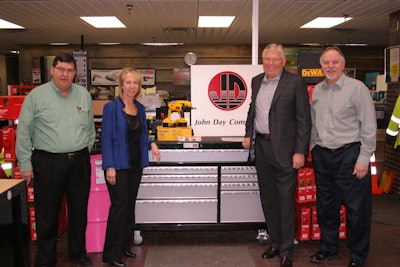
If there’s one word that describes what has allowed John Day Company to remain a successful, family-owned company for 106 years, it’s stability.
That comes from the Omaha, NE-based industrial and agricultural supplier’s management, where its top four members have a combined 144 years of experience with the company. CEO John Fonda, great grandson of founder John Day Sr., has been there for 35 years, 20 of those as president. Current president and CFO, Nancy Kurtenbach, has been there 29 years. COO and Inside Sales Manager Duane Chamberlain is 37 years in, while Outside Sales Manager Steve Regan is at 43 years.
That wealth of experience is what drives success at John Day today.
“It’s our level of technical support and our knowledge base,” says Kurtenbach. “We have a lot of long-term employees who have been in the business and the industry. Someone can call one of them and they won’t need a part number. We know our products. We know where to get products. There’s a lot of depth and resources there that really set us apart.”
“We’re 106 years old, and none of us look that age,” Fonda says with a laugh. “I think it’s given us a really strong base in our region. We’ve build a good reputation out here. Our customers know who the John Day Company is and we’re going to stand by the products that we sell.”
The Personal Touch
Being an independent company of around 100 employees, many have to wear multiple hats for JDC to provide its myriad of services besides just product supply. Given the rapid escalation of merger and acquisition activity in the market, the company says its stability is what has attracted new hires. “I think a lot of people – they work for someone who gets bought and they get laid off, and maybe hired back – I think our applicants see John Day Company as a very stable company, and family-oriented,” says Kurtenbach.
Part of the appeal of working at JDC is also its accessibility. With many employees taking on multiple roles, they get to see and touch and have a hand in many operations. That, and they can contact Nancy by just stopping by her office when need be. That’s a luxury most wholesale chains can’t offer. “They know who Nancy is as the president of the company. She’s there every day,” Fonda says. “If you’re working for XYZ and at a branch, you may never meet the president. Our employees have developed personal relationships with all of the management team over time, and it’s a value that they can talk to anybody at any time about pretty much any subject.”
Value-Added
John Day Company can technically be classified as a distributor, but that wouldn’t give justice to what the company is really about. JDC is just as invested, if not arguably more, in its value-added services. It’s those services – nearly two dozen that the company promotes – that make JDC stand out from other independents, as well as their wholesale competitors.
Some of JDC’s most well-known services include power tool repair, hose fabrication, bandsaw welding, chain sling fabrication, and tool regrind, along with a number of safety solution audits, inspections, and product training.
“We have continued to make ourselves known and unique enough in the marketplace to be different than the catalogue houses,” Fonda says. “When you see the large corporate-managed distributors, they have a huge amount of resources to decide one day they want to get into this, into that – things that 2-3 years later may not be the focus of where they’re going. I think the things we’re doing we believe are going to be long-term in nature for our customers. The things we continue to support were not built on a whim.”
JDC has been offering many of those services for 15 years or more. Step in the tool repair department and you’ll find specialist Jim Katzer at work on something, a service he has led for 10 years. In the re-grind room, JDC can drastically extend the life of something like a carbide steel gear cutting hob by sharpening it 16-20 times. Regan estimates a brand new high-quality hob can cost between $2,500-4,000 – whereas JDC charges only $250-300 per re-sharpen. That makes such a service extremely valuable.
Fonda says JDC initially got into power tool repairing when customers said it was taking 9 months for them to get some tools back that they sent for repairs to other sources. JDC does it within a month.
While he knows his customers appreciate those services, they still tend to be thankless jobs. “They really enjoyed that when it happened, and kind of forget it over time,” he says. “They just sort of expect it in the future. Then we have to meet those standards.”
Kurtenbach says a lot of the positive feedback the value-added services get aren’t so much from the end user, but from the managers of customers who want to see their associates do what they do best and have a resource to have tools repaired, or made. “A lot of manufacturers – the maintenance people like to do these things, but you see their upper management say, ‘no, you’re busy keeping our equipment up and running. Let’s outsource some of these services to John Day,’” she says. “I think the feedback we’re getting sometimes is at a higher level.”
What’s New?
Fonda and Kurtenbach emphasized that JDC always has a project on the table to increase the company’s efficiencies. Two years ago it purchased new software that was needed to move ahead in its e-content. JDC has a full e-commerce website and is in the process of revamping it to improve its content. “Customers who use it are giving us feedback. We realized there are areas for improvement and that’s why we’re tackling it,” says Chamberlain. Less than 5 percent of JDC’s sales came through e-commerce in 2014, but Chamberlain noted that would be a narrow definition of the company’s online orders since it doesn’t account for EDI sales, of which all of JDC’s integrated supply sites use.
Speaking of EDI, John Day is working on improving automation payables, aiming to allow invoices from vendors to come in EDI right through its ERP system. Kurtenbach says that will eventually help eliminate overhead in the accounts payable department, and make transactions more accurate.
On the CRM front, JDC finished implementing Android Tablets at the end of 2014 for its outside salespeople. The tablets can be operated audibly and transcribe spoken dialogue making it easy to update customer information and call reports. The devices and the CRM software speed up and simplify when the salesperson needs to pull up customer quotes, open orders, and product information.
Fighting the Independent Fight
The Omaha region certainly hasn’t been immune to the industrial distribution merger & acquisition landscape. Midwest Industrial Tool was acquired by DGI Supply in April 2011, and Fuchs Machinery was bought by Blackhawk Industrial one month later. Now, John Day is left as one of the few independents left in the area.
“At one point you’re used to competing with other independents that have a select group of suppliers, and some of those suppliers crossed over and some didn’t. So you each had some uniqueness back in the day,” says Fonda. “Somebody had Greenfield (Manufacturing), one would have 3M, one would have Norton. So we were the last of the Mohicans.”
Suddenly having to compete with DGI and Blackhawk made Fonda and JDC re-examine its role in the industrial business. Along with developing a management team, Kurtenbach took over Fonda’s role as president in June 2014. Fonda says his focus today is more on vendor relations and marketing in the area.
Overall, the focus for JDC, now more than ever, has been on how it can leverage its value-added services to set itself apart. “How does John Day Company now go into a marketplace when you have MSC, DGI, Grainger – those who have everything, and then ask how you are going to stand out?” Fonda says. “The new focus for us has to be to add value to the suppliers we determine are going to help make our future tomorrow.”
As one of the region’s last independent distributors, JDC has partnered closely with its top suppliers. Fonda said JDC has been determining what key suppliers it wants to market with, and hopes customers can see the difference between a company like John Day as opposed to a large wholesaler.
“I think, really, the suppliers do see us as a business partner,” Kurtenbach says. “Even on the customer side, they are more open to working with us and our suppliers because of the long-term relationships.”
Kurtenbach notes how at larger companies, there are still a lot of local employees who have always been there, but buyouts have deteriorated the relationships with customers that John Day maintains. A lot of the business relationships JDC currently has go back 50 or 60 years – the same companies John’s dad and grandfather worked with.
So has Fonda and John Day Company been approached to be acquired? Indeed. Fonda said some of the wholesalers who have contacted JDC are ones mentioned above. But given the history of JDC, he has no intention of giving in. Fonda says he relishes the unique opportunities that being an independent offers – like flexibility, having resources in-house and always ready, and not being tied down to having to work with someone in different locations for different projects.
“We’ve always been a family-owned business,” Fonda says. “We have a hundred associates, and my dad used to always say you could take that times four, so there’s 400 people out there we’re feeding. And we have a good legacy in this marketplace of 106 years.”
Fonda also has some words of wisdom for independent distributors who may be in the same boat as JDC.
“You can’t be looking over your shoulder at what everyone else is doing,” he says. “You see the capabilities that the major players have today – they certainly outweigh what you can do. So you have to figure out what you can be good at, what is your core business, and what you are able to have your people focus on. And then you have to run your own race.”























